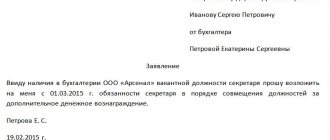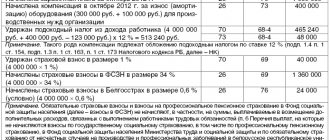Probably, as an entrepreneur, you have already repeatedly encountered difficulties with official registration when hiring a foreign citizen. It is even possible that now employing foreigners is an incredibly difficult process for you. However, you should not try to resolve this issue through informal registration, as this can become a real problem for you with huge financial losses. This article is devoted to the topic of hiring foreign citizens in 2020.
Rules for hiring foreign citizens in 2020
Hiring foreign citizens today is widespread in several sectors of the Russian economy. We are talking about the manufacturing sector, construction, housing and communal services and many others. This is due to a number of reasons:
- saving money spent on wages: foreign citizens agree to a lower rate than Russians;
- there is a difference in the mentality of foreigners and Russians, which explains the responsibility and hard work of most refugees and ordinary foreign watchmen.
However, the government regulates the labor market, preventing the official hiring of foreign citizens by Russian companies. If an entrepreneur wants to hire a foreigner, he must perfectly understand all the intricacies of this process. In 2020, they affect certain categories of citizens of other countries.
Foreigners with a residence permit who have permanent housing on Russian territory. These people can easily receive official registration when applying for a job in the same manner as a person with Russian citizenship. At the same time, hiring a foreign citizen with a residence permit occurs without permission and a patent. A foreigner will be provided with the same guarantees as a Russian citizen. It will only be important for the entrepreneur to check the validity period of the residence permit and notify the Ministry of Internal Affairs about the official employment of a foreign citizen in accordance with paragraph 8 of Article 13 of Federal Law No. 115-FZ “On the legal status of foreign citizens in the Russian Federation.”
Foreigners with a temporary residence permit can also obtain official employment without additional documentation. They, like foreigners with a residence permit, will not need a permit or patent. When hiring a foreign citizen with a temporary residence permit, an entrepreneur is obliged to inform the Ministry of Internal Affairs about this. It is also important to take into account the fact that a citizen of another country with a temporary residence permit can engage in labor activities exclusively in the territory where this document is issued. However, according to Order of the Ministry of Health and Social Development of Russia dated July 28, 2010 No. 564n, there are exceptions in connection with which a foreign citizen with temporary residence can work in other regions.
Foreigners with a temporary residence permit , but without a visa, are required to have a patent with them for official registration for work. This documentation will not be needed for those citizens who live in the Russian Federation on a permanent or temporary basis, as well as residents of the EAEU countries. In 2020, a patent for employing foreign citizens without a visa is valid for one year; it is not prohibited to extend it for a period of one month or more. An officially employed resident of another country whose patent has expired may be temporarily deprived of work by an entrepreneur until the document is reissued. Its re-registration can only take place once for a period of up to one year. The price of a patent in each locality is individual and depends on the coefficient entered for the given region. In 2020, the rate of the fixed advance payment, taking into account the deflator coefficient, is 1947.6 rubles, it should be adjusted to the regional coefficient. When hiring a foreign citizen, it is important to keep in mind that he can only work in the region in which he was issued a patent.
Foreigners are citizens of the EAEU. Recruitment of foreign citizens of EAEU countries in 2020 takes place on the same basis as residents of Russia. This category of foreigners has every chance of finding employment outside of migration registration and living in the Russian Federation for the full duration of a specially issued employment contract. However, in any case, it is very important for the employer to inform the Ministry of Internal Affairs about hiring a foreign citizen of the EAEU countries.
Visa foreigners with temporary stay. Hiring foreign citizens with a visa and temporary residence in the Russian Federation is more problematic. After the entrepreneur is allowed by the Ministry of Internal Affairs to hire a foreigner, he still needs to fill out a request for an invitation from the Ministry of Internal Affairs to issue a resident of another country to the Russian Federation. As an addition to the main documentation, a copy of the passport of a citizen of another country and a letter of authorization from the company are attached. This letter testifies to the entrepreneur’s obligations when hiring a foreign citizen to provide him with medical insurance, housing and means of subsistence. When an employee is in the work area and enters into an employment contract with the company, he will need to report this procedure to the Ministry of Internal Affairs.
It is also necessary to understand that hiring foreign citizens is successful only if they have a license to carry out labor activities on the territory of the Russian Federation. There are two types of tolerance:
- permission to employ foreign citizens with a visa;
- labor patent for foreign citizens without a visa and refugees.
Read the material on the topic: How to save on payroll taxes so that everyone is happy
What statuses can foreign citizens have?
In this case, the status of a foreigner should be understood as the legal status on the basis of which he can stay and work in the Russian Federation. There are several statuses depending on the specific situation:
- Temporarily staying. Such a citizen has the right to stay in Russia for up to 90 days on the basis of a migration card. He does not issue a temporary residence permit or work permit. In this case, there is no right to employment; a patent or permit will be required.
- Temporary resident. A temporary residence permit is issued for a period of up to three years, after which the citizen must either obtain a residence permit (residence permit) or leave the country. You have the right to work, you don’t need a patent.
- Permanent resident. This is a foreign citizen who has issued a residence permit - it is issued for a period of up to 5 years, it can be extended if necessary, but many prefer to obtain citizenship. It is possible to get a job on the basis of a residence permit; a patent is not required.
- Refugees. These include foreign citizens who have received temporary asylum in Russia. Permission will not be required, but they can work until the status is removed. In the future, they will have to issue a temporary residence permit.
- Highly qualified specialists. Such specialists are considered to be citizens who have the professional skills and knowledge necessary for the employer. Most often they are attracted for scientific activities. You will need permission to hire specialists, as well as a patent.
Note! In some cases, permission may still be required. It is not needed only for workers from Belarus or Kazakhstan: for them there is a simplified procedure, and they can find employment using passports.
How to correctly send a notice of hiring a foreign citizen
An entrepreneur must notify the Federal Migration Service of the Russian Federation about hiring a foreign citizen (we are not talking about the tax service, since this obligation of the employer was canceled on January 1, 2015 after the adoption of amendments to 115-FZ).
In the event of concluding an employment and/or civil law agreement when hiring a foreign citizen, a legal entity should notify the regional department of the former Federal Migration Service no later than three working days, which since July 1, 2016 has been transferred under the leadership of the Ministry of Internal Affairs and is currently called the General Directorate for Migration Issues (GUVM).
A notice of hiring a foreign citizen is issued individually for each person.
According to Federal Law No. 115 (with additions dated 04/06/2015), both the employer and the foreigners themselves have this obligation, for whom it is important to inform about their employment within two months from the date of receipt of the labor patent/work permit.
If the procedure for notifying municipal authorities about the hiring of a foreign citizen is violated, the legislation (Part 4 of Article 18.15 of the Code of Administrative Offenses) provides for the following penalties in the form of a fine:
- citizens in the amount of five to seven thousand rubles;
- employees of the enterprise in the amount of 35 to 70 thousand rubles;
- company (individual entrepreneur) in the amount of 400 thousand to 1 million rubles, or an administrative temporary termination of business activity is possible for a period of 14 to 90 days.
Fines have also been introduced in case violations are identified in filing applications for employment of foreign citizens.
Russian legislation provides for the following options for sending notifications.
- Bring it in person and submit it to the GUVM department in paper form. The GUVM employee who receives the documentation must check the correctness of completion and accuracy of the information contained. For a successful procedure, it is important to take with you documents confirming the authority and identity of the notifier.
- Send to postal address. The shipment must be issued in a valuable letter, to which must be added a list of the contents and two copies of the delivery receipt. One of them (with a tear-off part) will remain in the post office for a year, while the other will be sent to the Main Directorate for Migration. After delivery of the letter, you will be given a part of the form with a receipt mark, which is considered confirmation of the prompt execution of the notification of the Main Directorate of Migration and Migration adopted by law about the hiring of a foreign citizen.
- Send by email, if the GUVM office in your region provides such an opportunity.
- Although with some difficulties, you can send it using the municipal services website.
Notice of employment of a foreign citizen, sample filling
It is important to fill out the notification in Russian letters in clear handwriting. Forms with various strikethroughs, corrections, and omissions are invalid. Information about a foreign citizen, which is written in his passport in Latin letters, is also allowed to be copied into the form in Latin letters.
To correctly fill out the notification form for hiring a foreign citizen, it is important to enter the following information:
About the employer:
- name and form of ownership (if we are talking about an individual - full name);
- status (legal entity, individual entrepreneur, etc.);
- number in the Unified State Register of Legal Entities;
- code of main activity according to OKVED;
- if yes, then checkpoint and tax identification number;
- legal address and telephone number.
About the employee:
- full name, date and place of birth;
- citizenship;
- information from your identity card;
- number and validity period of the migration card;
- patent number or work permit number;
- registration address at the location and date of registration;
- specialty and other information about future work;
- the nature of the contract (labor or civil law).
An application for employment of a foreign citizen must be signed and certified with the company seal. If we are talking about an electronic application, then the signature will be electronic.
If the contract is terminated for any reason, this must also be stated in the notice. In case of dismissal of a foreign citizen, it is necessary:
- issue a notice of dismissal of an employee;
- certify the document with the seal of the enterprise;
- send a notification to the Main Directorate for Migration.
This procedure must take place within three days from the end of the foreigner’s work activity. These conditions apply individually to each of the dismissed employees.
When do you need a permit or patent for work?
Many people confuse the concepts of “permit” and “patent”, believing that these are absolutely identical documents. Actually this is not the case:
- The permit is issued for foreigners from visa countries;
- A patent will be required for foreign citizens from neighboring countries, for whom a visa to the Russian Federation is not required. Issued for up to 1 year, then it must be purchased again.
Now let’s look at what specific document is required for employment and residence in the Russian Federation, depending on the situation:
| Foreign citizen status | A document confirming the right to reside in the Russian Federation | What do you need for work: a permit or a patent? |
| Temporarily staying from countries that require a visa | Visa, migration card | Permission |
| Temporarily staying without a visa | Migration card | Patent |
| Citizens from the EAEU | Internal passport | Not required |
| Temporary residents | RVP | |
| Permanent residents | Residence permit | |
| Qualified specialists | Residence permit (optional) | Permit with a note that the specialist is highly qualified |
Who is a highly qualified specialist?
The most questions arise when attracting highly qualified specialists. According to Art. 13.2 Federal Law No. 115-FZ dated July 25, 2002, these are considered foreign citizens who have the appropriate experience and knowledge to work in certain industries on the territory of the Russian Federation. The greatest importance in determining “highly qualified” is the salary that a foreigner will receive in the Russian Federation:
| Category | Salary amount (RUB) per month | Explanation |
| Teachers or researchers | From 83 000 | If they work in universities, academies, research centers |
| Specialists in specific industries | From 83 500 | If foreigners work in industrial, commercial, tourism sectors |
| Specialists of certain categories of organizations | From 83 500 | If the company operates in the field of information technology and has state accreditation |
| Specialists invited by enterprises from the special economic zone | From 58 500 | If the company is introducing technology |
| Health workers | From 1,000,000 rub. in year | If they are invited to international medical institutions |
| Specialists employed at enterprises in the territory of the Republic of Crimea | From 83 500 | No additional conditions are established |
If a foreign specialist works at Skolkovo in any qualified position, there are no salary restrictions.
How foreign citizens are hired: instructions with explanations
1. First of all, find out the status of a foreign citizen . The procedure for hiring a foreign citizen begins with determining his status in Russia:
- temporarily staying on the territory of Russia - a foreigner who arrived in the Russian Federation with or without a visa and lives in the country on the basis of a patent or work permit;
- temporarily residing on the territory of Russia - a foreigner with a temporary residence permit, which is valid for three years from the date of issue;
- permanently residing in Russia - a foreigner with a residence permit, which is issued for five years in accordance with the conditions of the EAEU.
2. Check all migration documents.
When hiring a foreign citizen who is a migrant from a state with a visa regime, you will need:
- a copy of a foreign passport;
- migration card;
- work permit;
- current registration;
- SNILS;
- TIN;
- voluntary health insurance policy.
When hiring a foreign citizen who is a migrant from a state with a visa-free regime, you will need the same documents, with the exception of a work permit. In addition, a work patent and a receipt for payment for this document will be required.
When hiring foreign citizens of Kyrgyzstan, Armenia and Kazakhstan, the list of documentation is the same as for any other residents of states with a visa regime.
When hiring a foreign citizen, you must carefully check each document. Especially make sure of their actual validity periods, since expired documents of a foreigner may threaten the employer with a fine of up to one million rubles or temporary termination of business activities from 14 to 90 days.
3. Add the employee to the organization's staff.
1) Collect signatures from the employee on documents such as:
- rules for organizing internal labor procedures;
- collective agreement;
- other documents related to the implementation of labor activities at the enterprise.
2) Correctly formalize your employment relationship with a foreigner who came to the country without a visa. To employ a foreign citizen without a visa, an employment contract is required:
- The document is issued exclusively with an adult migrant.
- The agreement is drawn up only in Russian. You can also issue a second copy in the foreign citizen’s native language, but this is not included in the list of obligations of the employer.
- Information about a foreign citizen should not be taken from his words, but from the data indicated in his passport or other document proving his identity. It would be best to use information from a patent or work permit.
- The data must be absolutely the same: what is in the contract, what is in the patent or permit. Any mistake can threaten you with a serious fine or administrative suspension of your business activities.
- The contract must specify information about the patent or permit, which includes the series, number, validity period, by whom and when issued.
- The contract must also contain data from the VHI policy or contract for medical services.
- The employment contract is drawn up for an indefinite period. In some cases, under Article 59 of the Labor Code of the Russian Federation, a fixed-term contract can be concluded. Even the fact that a patent or permit has its own validity period does not make it permissible to hire a foreign citizen under a fixed-term contract (Article 327 of the Labor Code of the Russian Federation).
- When hiring a foreign citizen, be alert and monitor the validity of his documentation. As soon as they come to an end, the foreigner must be fired, otherwise you will again face a fine of up to one million rubles.
It is also important to issue an order for employment, familiarize the foreigner with it against signature, and make an entry in the work book.
If a foreigner does not have an accepted sample work book, the employer is obliged to issue it. Previous records of the work activity of a citizen of another country cannot be rewritten under any circumstances.
We have come to the final procedure for filling out documents when hiring a foreign citizen: issuing a personal card for the employee . This occurs according to the unified T2 form. Here the foreigner must sign, confirming that he has fully read the entries in the work book. It is also important to take the signature of a foreign citizen, proving his awareness of the processing of personal data.
4. Register the employee at the employer's premises.
If, when hiring a foreigner, it turns out that he is registered not in a residential building, but with a legal entity, then the employer, following the employment contract, is forced to register this employee for migration registration - to register him with his own company.
To carry out this procedure, you must fill out the form for notification of registration of a resident of another country for migration registration, established by Order of the Federal Migration Service of the Russian Federation No. 217 of September 23, 2010, and collect the following documentation:
- a copy of a foreign passport;
- a copy of the migration card;
- a copy of the previous registration;
- copy of the patent;
- a copy of the patent payment receipt;
- a copy of the employment contract.
Subsequently, you need to submit the notification form for migration registration with all photocopies to the regional or central FMS.
5. Notify the FMS about concluding an employment contract with a foreigner.
The employer must inform the Main Directorate for Migration Affairs of the Ministry of Internal Affairs (formerly the Federal Migration Service) that an employment or civil contract has been signed with a foreigner no later than three working days from the date the agreement was signed by a resident of another country.
6. Congratulations, you are now officially a payer of taxes and contributions on the salary of a foreign citizen. When hiring a foreign citizen, it is important to know that taxes will depend on the employee himself. If the case concerns a foreign citizen with temporary residence status who entered Russia in a manner that does not require a visa, the employer will face the following taxes on a monthly basis:
- Personal income tax – 13%;
- contributions to the Pension Fund – 22%;
- contributions to the Social Insurance Fund – 0.2% + Social Insurance Fund – 1.8%.
An entrepreneur does not have the right to pay a foreign citizen a salary below the minimum wage or give him a salary lower than his own compatriots working under the same conditions.
If violations are detected, the salary commissions will be forced to pay the remaining wages to employees, as well as all unpaid taxes. Plus, a monetary penalty of 20% of the amount of unpaid taxes will be added.
7. Along with hiring a foreign citizen, the employer has the obligation to monthly check receipts for payment of personal income tax under the patent . In case of late payment, the patent automatically ceases to be valid, and the employee becomes an illegal immigrant who has no right to work on the territory of the Russian Federation. Subsequently, the foreigner will need to cross the Russian border again and re-issue a patent.
8. If you need to fire a foreign citizen, issue an appropriate order and familiarize the foreigner with it against signature . Be sure to indicate the termination of the employment relationship in your work book. The foreigner signs the employee’s card (T2), confirming the return of the work book.
9. Don’t forget to notify the FMS of your dismissal.
Read material on the topic: How to minimize taxes: methods and schemes
Memo for employers
Memo for employers: how to formalize labor relations with persons located in the territory of the Russian Federation on the basis of a residence permit, temporary residence permit, as well as those with refugee status, temporary asylum
1 question:
What legal acts should an employer follow when hiring a foreign citizen?
Answer:
The main regulatory acts of the Russian Federation regulating the specifics of the labor activity of foreign citizens in Russia are the Labor Code of the Russian Federation (hereinafter referred to as the Labor Code of the Russian Federation), in particular Ch. 50.1 of the Labor Code of the Russian Federation, and Federal Law dated July 25, 2002 No. 115-FZ “On the legal status of foreign citizens in the Russian Federation” (hereinafter referred to as Federal Law dated July 25, 2002 No. 115-FZ).
2. Question:
What should you first pay attention to when hiring a foreign citizen or stateless person?
Answer:
1. First, you need to find out on what basis a foreign citizen is on the territory of the Russian Federation.
It is necessary to clearly understand that, depending on the mode of stay (residence), foreigners can be divided into permanently or temporarily residing in the territory of the Russian Federation and temporarily staying in the territory of the Russian Federation, as follows from paragraph. 10, 11, 12 p. 1 art. 2 of the Federal Law of July 25, 2002 No. 115-FZ.
2. Which document in this or that case is an identification document of a foreign citizen or stateless person.
3. It is necessary to know what permits a given person with a particular legal status needs to apply for a job.
Usually, to attract foreign workers, an organization must obtain permission to use foreign workers (Clause 4, Article 13 of Federal Law No. 115-FZ of July 25, 2002). But there are exceptions to this rule.
To carry out labor activities in the Russian Federation, a work permit or patent is not required for the following categories of persons:
- those who permanently reside in Russia on the basis of a residence permit;
- those who temporarily reside in the Russian Federation on the basis of a temporary residence permit;
- having refugee status in the Russian Federation;
- persons who have been granted temporary asylum on the territory of the Russian Federation.
4. Based on the peculiarities of the legal status of a foreign citizen or stateless person on the territory of the Russian Federation, it is necessary to know whether this person has the right to carry out labor activities within the subject of the Russian Federation of interest.
3. Question:
Features of employment for a foreign citizen or stateless person with a residence permit?
Answer:
First you need to understand what a residence permit is? According to paragraph 8, paragraph 1, article 2 of the Federal Law of July 25, 2002 No. 115-FZ, this is a document issued to a foreign citizen or stateless person to confirm their right to permanent residence in the Russian Federation, as well as their right to freely leave the Russian Federation and entry into the Russian Federation.
A residence permit issued to a stateless person is also a document proving his identity (clause 3, clause 2, article 10 of the Federal Law of July 25, 2002 No. 115-FZ).
Clause 3 Art. 8 of Federal Law No. 115-FZ of July 25, 2002 provides that a residence permit is issued without a limitation on the validity period.
A foreign citizen permanently residing in Russia does not require a work permit or a patent to carry out work activities (clause 1, clause 4, article 13 of Federal Law No. 115-FZ of July 25, 2002).
Since no restrictions are established by law, such a foreign citizen has the right to carry out labor activities throughout the entire territory of the Russian Federation.
4. Question:
Features of employment for a foreign citizen or stateless person with a temporary residence permit?
Answer:
According to paragraph 7, paragraph 1, article 2 of the Federal Law of July 25, 2002 No. 115-FZ - confirmation of the right of a foreign citizen or stateless person to temporarily reside in the Russian Federation until receiving a residence permit, issued in the form of a mark in the identity document of the foreign citizen or a stateless person, or in the form of a document of the established form issued in the Russian Federation to a stateless person who does not have a document proving his identity.
In this case, the identity document will be:
1) a document issued by a foreign state to a stateless person (for example, a passport of a stateless person, travel document) with a note on receipt of a temporary residence permit in the Russian Federation;
2) temporary residence permit (in the form of a separate document).
The validity period of this permit is three years (Clause 1, Article 6 of Federal Law No. 115-FZ of July 25, 2002).
A foreign citizen temporarily residing in the Russian Federation does not require a work permit or a patent to carry out labor activities in the Russian Federation; however, as a general rule, he can work only in the constituent entity of the Russian Federation in whose territory he is allowed temporary residence (clause 1, clause 4, p. 5 Article 13 of the Federal Law of July 25, 2002 No. 115-FZ).
Such a foreign citizen can work on the territory of other constituent entities of the Russian Federation in cases established by Order of the Ministry of Health and Social Development of Russia dated July 28, 2010 No. 564n. For example, according to clause 2 of the Appendix to the said Order, a foreign citizen temporarily residing in the Russian Federation has the right to carry out labor activities outside the boundaries of the subject of the Russian Federation in whose territory he is allowed temporary residence, if he performs work in certain professions and positions listed in this paragraph, in the following cases:
a) the employee is sent on a business trip. The total duration of labor activity of a foreign citizen outside the specified constituent entity of the Russian Federation in this case cannot exceed 40 calendar days within 12 calendar months;
b) permanent work is performed by the employee on the road or is of a traveling nature and this is determined by his employment contract. The total duration of labor activity of a foreign citizen outside the specified constituent entity of the Russian Federation in this case cannot exceed 90 calendar days within 12 calendar months.
5. Question:
Features of employment for a foreign citizen with refugee status?
Answer:
A refugee is a person who is not a citizen of the Russian Federation and who, due to fear of becoming a victim of persecution on the basis of race, religion, citizenship, nationality, membership of a particular social group or political beliefs, is outside the country of his citizenship and cannot (does not want) to use protection of this country due to fear; or, not having a specific citizenship and being outside the country of his previous residence as a result of such events, cannot (does not want) to return to it due to fears (Clause 1 of Article 1 of the Federal Law of February 19, 1993 No. 4528-1 “On Refugees” (hereinafter referred to as Federal Law of February 19, 1993 No. 4528-1)).
In this case, the identity document will be a refugee certificate (clause 7, article 4 of the Federal Law of February 19, 1993 No. 4528-1).
The certificate is issued for the period of recognition of its owner as a refugee, but not more than 3 years (clause 3 of the Regulations on the registration, issuance and exchange of a refugee certificate, approved by Decree of the Government of the Russian Federation of May 10, 2011 No. 356).
A person with refugee status does not need a work permit or a patent to carry out work activities (clause 11, clause 4, article 13 of Federal Law No. 115-FZ of July 25, 2002).
This person can carry out labor activities within the region of the Russian Federation, where he is registered with the territorial migration authority as a person who has been granted refugee status (exceptions - work on a rotational basis, business trips, work with daily travel from the place of stay to the place of work and back ).
6. Question:
Features of employment for a foreign citizen or stateless person located on the territory of the Russian Federation on the basis of temporary asylum?
Answer:
Temporary asylum may be granted to a foreign citizen or stateless person if they:
1) have grounds for recognition as a refugee, but are limited to a written application with a request for the opportunity to temporarily stay in the territory of the Russian Federation;
2) do not have grounds for recognition as a refugee under the circumstances provided for by this Federal Law, but for humanitarian reasons cannot be expelled (deported) from the territory of the Russian Federation (clause 2 of Article 12 of the Federal Law of February 19, 1993 No. 4528-1).
A certificate is issued to a person who has received temporary asylum for the period of its provision, but not more than one year (clause 2 of Order of the Ministry of Internal Affairs of Russia dated September 28, 2017 No. 741 “On approval of the Procedure for registration, issuance and exchange of a certificate of temporary asylum for territory of the Russian Federation...").
For this category of persons, the identification document will be a certificate of temporary asylum in the territory of the Russian Federation (Clause 3 of Article 12 of the Federal Law of February 19, 1993 No. 4528-1).
A person who has received temporary asylum does not need a work permit or a patent to carry out work activities (Clause 12, Clause 4, Article 13 of Federal Law No. 115-FZ of July 25, 2002).
Carries out labor activities within the region of the Russian Federation, where he is registered with the territorial migration authority as a person who has been granted temporary asylum (exceptions - work on a rotational basis, business trips, work involving daily travel from the place of stay to the place of work and back).
7. Question:
What documents are required to conclude an employment contract with a foreign citizen?
Answer:
When hiring a foreign citizen, in accordance with Art. Art. 65, 327.3 of the Labor Code of the Russian Federation must present to the employer, in particular, the following documents:
1) passport or other identity document;
2) work book, if not, then the employer must issue it;
3) insurance certificate of state pension insurance. If this is the first place of work for a foreigner, then the employer must issue an insurance certificate;
4) a voluntary medical insurance agreement (policy) valid on the territory of the Russian Federation (only for persons with a temporary residence permit). This document is not needed if the employer has entered into an agreement with a medical organization to provide paid medical services to a foreign employee;
5) a document on education, qualifications or special knowledge - when applying for a job that requires special knowledge or special training.
6) a certificate of the presence (absence) of a criminal record and (or) the fact of criminal prosecution or the termination of criminal prosecution on rehabilitative grounds - when applying for a job related to activities to which persons who have or have had a criminal record are not allowed (receive from the Federal Public Institution " Main Information and Analytical Center of the Ministry of Internal Affairs of the Russian Federation" at the address: Moscow, Novocheremushkinskaya St., 67).
7) a certificate stating whether a person is or is not subject to administrative punishment for the consumption of narcotic drugs or psychotropic substances without a doctor’s prescription or new potentially dangerous psychoactive substances - when applying for a job related to activities to which persons punished for the specified offenses, until the expiration of one year from the date of completion of the execution of this resolution.
Military registration documents are not required for foreign citizens (Part 3 of Article 327.3 of the Labor Code of the Russian Federation). For the GPC agreement, the same documents are requested, except for the work book (based on Article 65 of the Labor Code of the Russian Federation).
8. Question:
Are there any other peculiarities when concluding an employment contract with foreign citizens?
Answer:
There are a few other common features:
- An employment contract can only be concluded with a foreigner who has reached the age of 18, unless otherwise established by federal laws (part 3 of article 327.1 of the Labor Code of the Russian Federation, paragraph 1 of paragraph 4 of article 13 of the Federal Law of July 25, 2002 No. 115-FZ).
- An employment contract with a foreign citizen must contain all the necessary information and mandatory conditions provided for in Art. 57 Labor Code of the Russian Federation. In addition, the employment contract must include the following information and conditions:
1) for foreigners temporarily staying in Russia:
- information about a work permit or patent, except for cases established by federal laws or international treaties of the Russian Federation (paragraph 2, part 1, article 327.2 of the Labor Code of the Russian Federation);
- a condition for providing the employee with medical care during the term of the employment contract, including details of a voluntary health insurance agreement (policy) or an agreement between the employer and a medical organization for the provision of paid medical services to the employee (except for cases established by federal laws or international treaties of the Russian Federation). These contracts (policies) must ensure the provision of primary health care and specialized medical care in an emergency manner. This is established by Part 2 of Art. 327.2 Labor Code of the Russian Federation;
2) for foreigners temporarily residing in Russia:
- information about a temporary residence permit in Russia, except for cases established by federal laws or international treaties of the Russian Federation (paragraph 3, part 1, article 327.2 of the Labor Code of the Russian Federation);
3) for foreigners permanently residing in Russia:
- information about a residence permit, except for cases established by federal laws or international treaties of the Russian Federation (paragraph 4, part 1, article 327.2 of the Labor Code of the Russian Federation).
9. Question:
For how long can an employer enter into an employment contract with a foreign citizen or stateless person?
Answer:
An employment contract with a foreigner can be concluded either for a certain period or for an indefinite period. At the same time, a fixed-term employment contract is concluded only in the cases provided for in Art. 59 Labor Code of the Russian Federation. This is provided for in Part 5 of Art. 327.1 Labor Code of the Russian Federation.
10. Question:
Who and how must be notified about the hiring or dismissal of a foreign worker?
Answer:
In accordance with paragraph 8 of Art. 13 of Federal Law No. 115-FZ of July 25, 2002, the employer is obliged to notify the territorial migration authority of the conclusion or termination of an employment contract with a foreign citizen. Such notification must be made by sending the appropriate document in paper or electronic form within a period not exceeding three working days from the date of conclusion of the employment contract in accordance with Order of the Ministry of Internal Affairs of Russia dated January 10, 2018 No. 11 (notification forms are attached - Appendix 1 and 2).
According to the position of the Supreme Court of the Russian Federation, this obligation arises for the employer even in the case where there is no employment contract with the employee in writing (Resolution No. 25-AD10-6 dated July 14, 2010).
The forms and procedure for submitting notifications about the conclusion and termination (termination) of employment (civil law) contracts with foreigners are approved by Order of the Ministry of Internal Affairs of Russia dated January 10, 2018 No. 11.
Information is provided regarding each foreigner hired for work. The notification form must be filled out legibly in Russian by hand or using technical means. The use of abbreviations, strikethroughs and corrections is not permitted. This follows from paragraphs 3, 4 of the Procedure for the submission by employers or customers of work (services) of notifications on the conclusion and termination (termination) of employment contracts or civil contracts for the performance of work (provision of services) with foreign citizens (stateless persons) ( hereinafter referred to as the Procedure for Submitting Notifications) given in Appendix No. 15 to Order No. 363 of the Ministry of Internal Affairs of Russia dated June 4, 2019.
If the notification is submitted on paper directly to the migration department, then the person who submits it must present documents proving his identity and authority, which follows from the content of clause 7 of the Procedure for submitting notifications. Confirmation that the notification has been received is a certificate of acceptance of the notification (Appendix No. 2 to the Procedure for Submitting Notifications) issued to the employer (customer of work (services)) or his representative by the responsible official of the relevant department. This follows from paragraph 3, clause 8 of the Procedure for submitting notifications.
If the notification is sent to the migration department in electronic form, then the official, no later than the working day following the day of receipt of such a document, sends an electronic message about the receipt of the notification to the person who submitted it. This is indicated in clause 9 of the Procedure for Submitting Notifications.
11. Question:
What personal income tax rate applies in this or that case?
Answer:
In this matter, it is again important to pay attention to what legal status a foreign citizen or stateless person has.
For persons who are on the territory of the Russian Federation on the basis of a residence permit or temporary residence permit, personal income tax is calculated at a rate of 13%, the tax base is determined on an accrual basis using deductions, since usually persons from this category are tax residents (located on the territory of the Russian Federation at least 183 calendar days during the year).
If a foreigner is not a tax resident of the Russian Federation, then the tax rate will be 30% and there will be no deductions for personal income tax (Article 224 of the Tax Code of the Russian Federation).
Labor income (including vacation pay) of an employee who has received temporary asylum or refugee status in the Russian Federation is subject to personal income tax at a rate of 13%, regardless of whether he is a tax resident or not (paragraph 7, paragraph 3, article 224 of the Tax Code of the Russian Federation, Letter from the Ministry of Finance Russia dated 04/01/2016 No. 03-04-06/18552).
12. Question:
What fees must be paid?
Answer:
For all categories of foreign citizens, the employer must pay the following contributions:
- to the Pension Fund of Russia - a rate of 22% within the limit and 10% above it (clause 2, clause 1, article 425 of the Tax Code of the Russian Federation);
- to the Compulsory Medical Insurance Fund - the rate is 5.1% (clause 2, clause 2, article 425 of the Tax Code of the Russian Federation);
- to the Social Insurance Fund - the rate is 2.9% (clause 3, clause 2, article 425 of the Tax Code of the Russian Federation).
13. Question:
What administrative responsibility is provided for the employer in this or that case?
Answer:
| Violations | Person held accountable | Responsibility measures | Norm |
| Involving a foreigner in labor activities outside the boundaries of the constituent entity of the Russian Federation in whose territory he was issued a work permit, patent or temporary residence permit | Citizen | Fine from 2 thousand to 5 thousand rubles. | Part 1 art. 18.15, note to art. 18.1 Code of Administrative Offenses of the Russian Federation |
| Executive | Fine from 25 thousand to 50 thousand rubles. | ||
| Entity | Fine from 250 thousand to 800 thousand rubles. or administrative suspension of activities for a period of 14 to 90 days | ||
| Individual entrepreneur | |||
| Failure to notify or violation of the procedure and (or) form of notification to the territorial body of the federal executive body exercising federal state control (supervision) in the field of migration about the conclusion or termination (termination) of an employment contract or a civil contract for the performance of work (rendering services) with by a foreign citizen within a period not exceeding three working days from the date of conclusion, termination (termination) of the contract, if such notification is necessary in accordance with federal law | Citizen | Fine from 2 thousand to 5 thousand rubles. | Part 3 Art. 18.15, note to Art. 18.1 Code of Administrative Offenses of the Russian Federation |
| Executive | Fine from 35 thousand to 50 thousand rubles. | ||
| Entity | Fine from 400 thousand to 800 thousand rubles. or administrative suspension of activities for a period of 14 to 90 days | ||
| Individual entrepreneur | |||
| Provided by Parts 1 - 3 of Art. 18.15 Code of Administrative Offenses of the Russian Federation, violations that were committed in Moscow, St. Petersburg, Moscow or Leningrad region | Citizen | Fine from 5 thousand to 7 thousand rubles. | Part 4 art. 18.15, note to art. 18.1 Code of Administrative Offenses of the Russian Federation |
| Executive | Fine from 35 thousand to 70 thousand rubles. | ||
| Entity | Fine from 400 thousand to 1 million rubles. or administrative suspension of activities for a period of 14 to 90 days | ||
| Individual entrepreneur | |||
| Failure by the employer or customer of work (services) to comply with the restrictions established by federal law on the performance of certain types of activities by foreigners | Citizen | Fine from 2 thousand to 4 thousand rubles. | Part 1 art. 18.17, note to art. 18.1 Code of Administrative Offenses of the Russian Federation |
| Executive | Fine from 45 thousand to 50 thousand rubles. | ||
| Entity | Fine from 800 thousand to 1 million rubles. or administrative suspension of activities for a period of 14 to 90 days | ||
| Individual entrepreneur | |||
| Submitting knowingly false information about a foreigner or forged documents when carrying out migration registration, if these actions do not contain signs of a criminal offense | Citizen | Fine from 2 thousand to 5 thousand rubles. | Part 2 Art. 19.27, note to Art. 2.4 Code of Administrative Offenses of the Russian Federation |
| Executive | Fine from 35 thousand to 50 thousand rubles. | ||
| Individual entrepreneur | |||
| Entity | Fine from 350 thousand to 800 thousand rubles. |
14. Question:
How to fire a foreign citizen or stateless person?
Answer:
Dismissal of a foreign employee is permitted on any of the general grounds provided for in Art. 77 of the Labor Code of the Russian Federation, and is drawn up in accordance with Art. 84.1 Labor Code of the Russian Federation.
At the same time, there are a number of features of terminating an employment contract with a foreign employee, including special grounds for dismissal of such employees.
| Foreigners category | Grounds for dismissal | Norms |
| All foreigners | Bringing the number of foreign workers into compliance with restrictions on labor activities established by federal laws, decrees of the President of the Russian Federation, and decrees of the Government of the Russian Federation | Clause 9, Part 1, Art. 327.6 Labor Code of the Russian Federation |
| Temporarily staying in the Russian Federation | 1. Suspension, expiration, cancellation of permission to attract and use foreigners | Clause 1 part 1 art. 327.6 Labor Code of the Russian Federation |
| 2. Cancellation of work permit or patent | Clause 2, Part 1, Art. 327.6 Labor Code of the Russian Federation | |
| 3. Expiration of a work permit or patent | Clause 5, Part 1, Art. 327.6 Labor Code of the Russian Federation | |
| 4. Expiration of the validity period of a VHI agreement (policy) on the territory of the Russian Federation or termination of the agreement concluded by the employer with a medical organization on the provision of paid medical services | Clause 8, Part 1, Art. 327.6 Labor Code of the Russian Federation | |
| 5. The impossibility of providing the employee with the previous job after the end of the temporary transfer period in accordance with Part 2 of Art. 327.4 Labor Code of the Russian Federation | Clause 10, Part 1, Art. 327.6 Labor Code of the Russian Federation | |
| 6. Impossibility of temporary transfer of an employee in accordance with Part 3 of Art. 327.4 Labor Code of the Russian Federation | Clause 11, Part 1, Art. 327.6 Labor Code of the Russian Federation | |
| Temporarily residing in the Russian Federation | 1. Cancellation of a temporary residence permit in the Russian Federation | Clause 3, Part 1, Art. 327.6 Labor Code of the Russian Federation |
| 2. Expiration of the temporary residence permit in the Russian Federation | Clause 6, Part 1, Art. 327.6 Labor Code of the Russian Federation | |
| Permanently residing in the Russian Federation | 1. Cancellation of a residence permit in the Russian Federation | Clause 4, Part 1, Art. 327.6 Labor Code of the Russian Federation |
| 2. Expiration of the validity period of a residence permit in the Russian Federation | Clause 7, Part 1, Art. 327.6 Labor Code of the Russian Federation |
Terms for termination of the contract when certain grounds for dismissal are applied
The employment contract is terminated after one month from the date of expiration (clauses 5 - 8, part 1, part 2, article 327.6 of the Labor Code of the Russian Federation):
- work permit or patent;
- temporary residence permits in the Russian Federation;
- residence permit in the Russian Federation;
- an agreement (policy) of voluntary medical insurance or an agreement on the provision of paid medical services in the territory of the Russian Federation.
The employer is obliged to warn the foreign employee in writing no later than three calendar days before dismissal on the following grounds (Part 4 of Article 327.6 of the Labor Code of the Russian Federation):
- impossibility of providing the employee with his previous job after the end of the temporary transfer period in accordance with Part 2 of Art. 327.4 of the Labor Code of the Russian Federation (clause 10, part 1, article 327.6 of the Labor Code of the Russian Federation);
- impossibility of temporary transfer in accordance with Part 3 of Art. 327.4 of the Labor Code of the Russian Federation (clause 11, part 1, article 327.6 of the Labor Code of the Russian Federation).
In some cases, the employer is required to pay foreign workers severance pay in the amount of two weeks' average earnings. For example, in case of dismissal in connection with the reinstatement of an employee who previously performed this work, or in connection with the employee’s refusal to continue work due to a change in the terms of the employment contract determined by the parties (Part 3 of Article 178 of the Labor Code of the Russian Federation).
Who faces fines for hiring foreign citizens
The laws of the Russian Federation provide for punishment of entrepreneurs in the form of a fine for deviations from migration legislation when hiring a foreign citizen.
At the present stage, the following types of fines are valid:
- from five to seven thousand rubles – for illegal employment of foreign citizens;
- from 400 thousand to one million rubles or temporary termination of business activity for a period of 14 to 90 days - for legal entities for illegally hiring foreign citizens;
- from 35 to 70 thousand rubles – for an official for illegally hiring a foreign citizen.
The same fines are imposed if the employer did not inform or did not comply with the deadlines for notifying the FMS about the fact of drawing up an employment contract when hiring a foreign citizen or about the termination of the contract and the dismissal of a newcomer.
Also, in addition to the above information, the same standards that control the powers of Russian employees apply to the entrepreneur. If the rights of a foreign employee are violated, the same penalties will be applied to the employer as if he had violated the rights of an employee with Russian citizenship.
Responsibility for violation of migration legislation
When hiring for a main position or part-time position, the employer is obliged to notify the regional office of the Ministry of Internal Affairs about the concluded contract. This must be done within 3 days. The requirement is determined by Federal Law No. 115 of July 25, 2002. Violation of established regulations entails a fine. The size is regulated by art. 18.15 clause 3 of the Code of Administrative Offenses of the Russian Federation:
- For an official, the sanction is 35-50 thousand rubles.
- For the employer - from 400 to 800 thousand rubles, or suspension of activities for up to 3 months.
Therefore, the head of the department and the personnel department must strictly control the issue of employment of non-residents. Otherwise, not only the legal entity, but also everyone involved in the violation will be held liable.
Attracting foreign citizens as workers has its own characteristics. A non-resident is required to obtain a work permit and provide the company with a complete list of documents. He, in turn, notifies the authorized migration authority about the conclusion of an employment agreement with such a person, which allows the service to track their movement around the country.
Highly qualified specialists
Today, Russian legislation recognizes another group of foreigners with or without a visa - highly qualified specialists. The hiring procedure for such employees differs from the standard one.
This group includes foreign citizens with experience in a certain field, whose annual salary is at least 700 thousand rubles. For employees of enterprises resident in technology-innovative special economic zones, no less than 1 million rubles. For employees of enterprises resident in other special economic zones, no less than 2 million rubles. When hiring highly qualified specialists from abroad, you should take into account some features:
- In this case, there is no requirement for a quota for issuing invitations or work permits.
- Regardless of the profession, such a specialist has the right to work throughout the territory of the Russian Federation.
- The employer does not require permission to hire foreign labor. However, the employee must first obtain a work permit.
- The work permit is valid for no more than 3 years. Moreover, it can be extended an unlimited number of times.
- Such specialists are not allowed to carry out activities related to religion on Russian territory.
- The employer undertakes to regularly inform the FMS about the fulfillment of obligations to pay wages, termination of employment contracts and the provision of unpaid leaves of more than 1 month per year.
- The employer is obliged, no later than 1 month after a highly qualified specialist receives a work permit, to submit to the migration service confirmation that he is registered with the tax office.
- A highly qualified specialist does not have the right to take out pension insurance in Russia.
Fines for illegal employment of foreigners
The labor of illegal migrants is severely punished by law. An overly “economical” entrepreneur or one who does not want to burden himself with official registration cannot avoid administrative liability in the form of substantial fines for:
- incomplete package of documents;
- expired documents;
- work with a revoked patent (for example, for late advance payment);
- an undrafted employment contract;
- deviation from the employment procedure;
- work not in the specialty specified in the permits;
- violation of labor protection in relation to migrants (as well as other workers).
An individual will have to pay from 5 to 7 thousand rubles. for procedural violations and 35-70 thousand rubles. for illegal employment of foreigners. The organization will pay from 400 thousand to 1 million rubles, and its activities may also be suspended for a period of 2 weeks to 3 months.
The foreign worker himself will also be subject to a monetary sanction in the amount of 2 to 5 thousand rubles.
How to apply for a job to a foreigner with a visa: step-by-step instructions
The procedure for employing workers from other countries on the basis of a visa is as follows:
- To begin with, the employer must obtain permission to attract this category of workers by first submitting a notification of the need for foreign personnel to the Employment Center.
- The application is reviewed within 25 days, after which you receive a response about the decision made.
- If you want to employ a specific person (a highly qualified specialist) from another state, you will have to issue an invitation to enter. At the same time, you must submit documents for the employee to obtain a work permit in the Russian Federation.
- Conclude an employment contract (TA) after receiving a work permit.
“Some organizations, research and educational institutions need highly qualified specialists, whom we can attract from other countries. For this purpose, suitable working conditions must be created. Foreigners themselves with the appropriate status have the right to apply for a residence permit and temporary residence permit in a simplified manner; in some cases, they can obtain citizenship within a few months after crossing the border.”
V.V. Putin, President of the Russian Federation.
Common Mistakes
Mistake #1. A patent or work permit is always required.
No, they are needed only if the foreigner does not have a temporary residence permit or residence permit. If a permit or residence permit is obtained, they already give the right to work in Russia.
Mistake #2. It is not necessary to notify the Employment Center about the need for workers.
No, by law, enterprises must submit information about available vacancies to the Employment Center every month. If you do not do this, you will have to pay a fine. In addition, the manager will not be given permission to attract a foreign specialist.
The need for a legal framework
According to statistics, labor migration to the Russian Federation is increasing every year. Unfortunately, not all the work of foreign citizens is legal, the reason for this is the reluctance of arriving migrants to pay taxes, and the reluctance of employers to contribute funds to the funds provided for by law and carry out registration according to a complicated procedure.
The state is trying to regulate this process by pursuing illegal employment, as well as revising approaches to the legislative framework of this issue.
Until 2020, the main legislative basis for those planning to work in the Russian Federation was the Decree of the President of the Russian Federation “On the attraction and use of foreign labor in the Russian Federation” and the Federal Law “On the legal status of foreign citizens in the Russian Federation.” However, in 2020 the latter was revised, many of its provisions have lost legal force. The changes affected:
- entry procedure for foreigners planning employment;
- the entire migrant registration system;
- the process of registering their employment.











